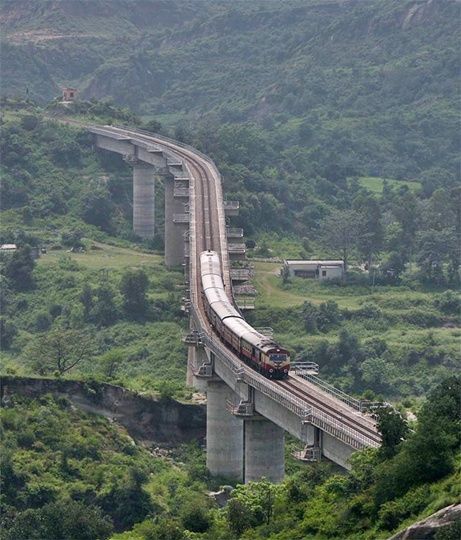When trains and stations become desirable again, we might have a murder mystery with the Mumbai-Ahmedabad bullet train as a setting, says Bibek Debroy.

Photograph: Mukesh Gupta/Reuters
What is common to Bollywood films 12 O'Clock (1958), The Train (1970), Parwana (1971), Do Anjane (1976) and Teesra Kaun (1994)? The answer is obvious.
In each, a crime/murder is committed on a train. If one sticks to crime fiction in English, there is a long list of books where murders occur on trains - Strangers on a Train (Patricia Highsmith, made famous by Alfred Hitchcock), The Wheel Spins (Ethel Lina White, also made famous by Hitchcock), Murder on the Orient Express (Agatha Christie, this didn't require a film to make it famous), Stamboul Train (Graham Greene), The Necropolis Railway (Andrew Martin), The Edge (Dick Francis), 4.50 from Paddington and The Mystery of the Blue Train (both by Agatha Christie), Mr Norris Changes Trains (Christopher Isherwood), The Taking of Pelham One Two Three (John Godey).
My intention isn't to compile a complete list and I am sure you have other favourites to add.
Yes, I do know about Emile Zola's La Bête Humaine. I didn't mention it because it was in French. Nor did I forget two Arthur Conan Doyle stories, The Lost Special and The Man with the Watches.
These are stories, not books. Interestingly, in neither of these did Doyle mention Sherlock Holmes by name.
In the former, he was "an amateur reasoner of some celebrity"; in the latter, just an unnamed criminal investigator.
Also, this is about trains proper, not so much stations or tracks.
The origin of railways in India is conventionally dated to 1853 and 150 years from 1853, several books were published on railways.
One of these, Our Indian Railway, was edited by Roopa Srinivasan, Manish Tiwari and Sandeep Silas. Any such book, published or proposed, has standard themes.
Like Casablanca's "round up the usual suspects", you round up usual themes.
This edited volume had an unusual contribution: an essay by Peter Morey on the way railways were depicted in two Indian novels - Bhowani Junction and Train to Pakistan.
These are two specific novels. But, as with elsewhere in the world, there are instances to illustrate the way railways have pervaded literature and films.
Whether it is Anita Nair (Ladies Coupe), Monisha Rajesh (Around India in 80 Trains), Paul Theroux (The Great Railway Bazaar), Edith Nesbit (Railway Children), Darjeeling Limited, The Burning Train, or Chennai Express, you will think of several examples.
True, there is a bias because of populations I am sampling from - writing in English and films in Hindi. Indeed, Ruskin Bond compiled a remarkable anthology of 18 Indian Railway Stories.
Though my focus is on English, I should mention Shubhada Gogate's Marathi novel Khandalyachya Ghatasaathi, abut building the Mumbai-Pune railway line across the Sahyadri hills.
After all, the railway minister quoted this in his 2015-16 Budget speech.
But do railways figure in crime fiction and films? I have given you global examples to show railways feature in this genre.
I have also given you illustrations of Indian (as in Hindi) crime/thriller films, with railways featuring prominently. Now try to think of Indian (written in English) crime fiction involving railways.
It is extremely difficult. I have been able to think of Incident on the Kalka Mail (Satyajit Ray), Night Train to Jamalpur (Andrew Martin) and Inspector Ghote Goes by Train (H R F Keating).
I am not even sure Andrew Martin and Keating should be on that list; they should probably be excluded. Ergo, unlike Indian film-makers, Indian writers of crime fiction don't like settings with trains in them.
This is quite unlike British railway fascination during the Victorian period and beyond.
One could argue the crime genre is somewhat alien to India and a trifle elitist. Therefore, it has never quite taken off.
Because of crime films set on trains, I think this is at best a partial explanation.
I suspect the sampling bias of writing in English may have something to do with it. Written in English, when did crime fiction take off in India? (Incident on the Kalka Mail was initially written in Bengali. It was translated into English.
Ray has written other stories set on trains too. For example, Barin Bhowmick's Ailment, translated again, was included in the Ruskin Bond anthology.)
I can't think of too many authors before the 1970s, even if I extend crime fiction to cover thrillers.
That may well be a more complete answer. By the time this genre emerged in English, railways had lost their charm.
It was no longer romantic and exotic to have a train as a setting.
For this to be plausible, one should check with vernacular crime fiction, with a caveat.
Pulp fiction apart, crime fiction never quite took off, not even in the vernacular.
I suspect vernacular crime fiction was largely limited to Tamil, Bengali, Hindi, Urdu and Marathi.
I am familiar with the ones in Bengali, not the others. I have already mentioned Ray and Feluda.
I can cite examples from Byomkesh Bakshi too, as in books, not just films, and other detectives also.
Trains occur frequently. Indeed, when trains and stations become desirable again, we might have a murder mystery with the Mumbai-Ahmedabad bullet train as a setting.
The writer is a member of the National Institution for Transforming India Aayog. The views are personal.











